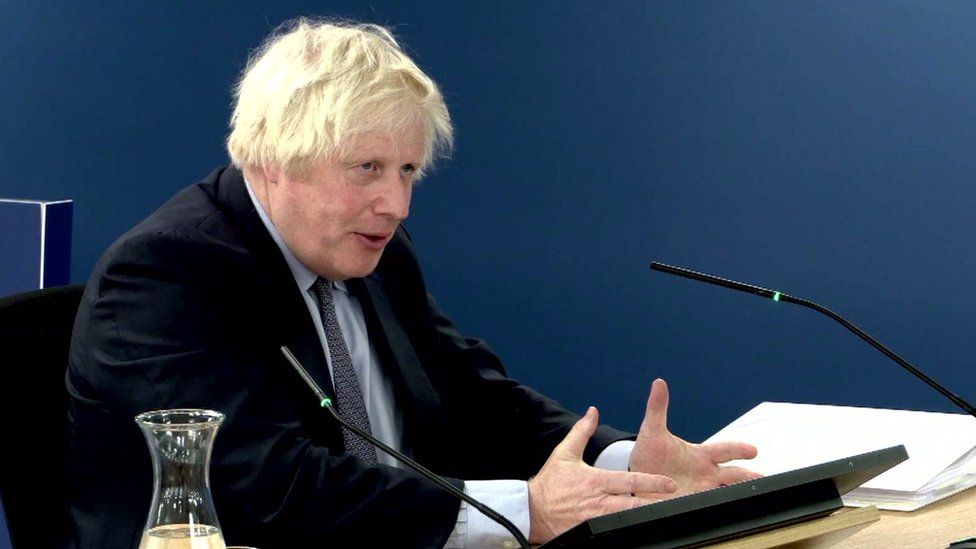ARTICLE AD BOX
 Image source, Covid Inquiry
Image source, Covid Inquiry
By Paul Seddon
Politics reporter
Boris Johnson has said he should have "twigged" the seriousness of Covid sooner, conceding earlier action could have been taken against the virus.
Giving evidence to the Covid inquiry, the former prime minister said he had underestimated the "scale and the pace of the challenge" posed.
But he said this was also true of scientists and the "entire Whitehall establishment".
And he insisted ministers did their "level best" in the circumstances.
In the first of two days of testimony, Mr Johnson sought to defend his record in office, which has come in for criticism from other witnesses who have given evidence to the inquiry.
He defended the timing of the first lockdown, saying that modelling had been incorrect and he had been advised not to impose measures too early.
He admitted to a "certain amount of incoherence in our thinking," but added: "Once we decided to act, I think it was pretty fast from flash to bang."
He began his testimony by saying he was sorry for the "pain and the loss and the suffering" people experienced during the pandemic.
His comments were interrupted by protesters, who were ordered to leave the inquiry room. Some members of bereaved families stood up holding pieces of paper, spelling out the message: "The dead can't hear your apologies."
Mr Johnson has been criticised for being slow to make decisions during the pandemic and being unable to make up his mind about what to do.
In his testimony, Mr Johnson defended his approach, adding that Covid had required "completely novel" measures and it was his job to "go through the arguments".
He added that people within government had collectively been reluctant to believe worse-case predictions about the impact of the virus, given the experience of previous diseases.
"It would certainly be fair to say of me, the entire Whitehall establishment, scientific community included, that we underestimated the scale and the pace of the challenge," he said.
He added that he was subsequently "rattled" by scenes of chaos in northern Italy in mid-February, when pictures of swamped hospitals hit the world's media.
"We should have collectively twigged much sooner. I should have twigged," he added.
Over more than five hours of testimony, he also:
- Said the gender balance of his team should have been better and "too many meetings were male-dominated"
- Admitted he had been unable to retrieve around 5,000 WhatsApp messages from his old phone between January and June 2020, blaming technical problems
- He denied deleting any messages, adding he had done "his best" to hand over all relevant evidence to the inquiry
- Claimed his cabinet ministers were "more reluctant" than him to impose restrictions
- Conceded he should not have shaken hands with patients during a hospital visit in March 2020, adding he should have been more "precautionary"
He added, however, that given what is known now, mass gatherings should have been stopped earlier than they were.
"With hindsight, as a symbol of government earnestness rather than just being guided by the science, we should perhaps have done that," he said.
He also defended his decision to keep Matt Hancock as health secretary, despite being urged to sack him by his former adviser Dominic Cummings, telling the inquiry he considered him a "good communicator".
He also rejected suggestions that expletive-laden WhatsApp messages between his advisers revealed by the inquiry showed a "toxic" culture in his Downing Street operation.
The language in the messages reflected the "deep anxiety" of people doing their best, he said.
He added it also showed that the people around him were "naturally self-critical, and critical of others," adding that this was "creatively useful" when it came to making decisions.

 1 year ago
23
1 year ago
23








 English (US) ·
English (US) ·